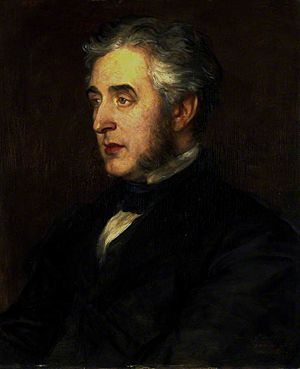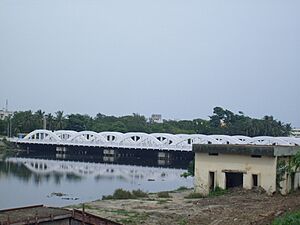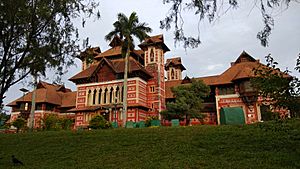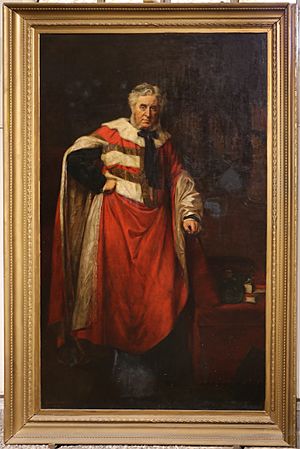Francis Napier, 10th Lord Napier facts for kids
Quick facts for kids
The Lord Napier
|
|
|---|---|

Portrait of Francis Napier, 10th Lord Napier in 1866
|
|
| Governor-General of India | |
|
Acting
|
|
| In office 24 February 1872 – 3 May 1872 |
|
| Monarch | Queen Victoria |
| Preceded by | Sir John Strachey As Acting Viceroy |
| Succeeded by | The Lord Northbrook |
| Governor of Madras Presidency | |
| In office 27 March 1866 – 19 February 1872 |
|
| Preceded by | Sir William Thomas Denison |
| Succeeded by | Alexander John Arbuthnot As Acting Governor |
| Ambassador of the United Kingdom to Russia | |
| In office 1861–1864 |
|
| Preceded by | John Crampton |
| Succeeded by | Andrew Buchanan |
| Personal details | |
| Born | 15 September 1819 Thirlestane Castle, Selkirkshire, United Kingdom |
| Died | 19 December 1898 (aged 79) Florence, Kingdom of Italy |
| Spouse | Anne Jane Charlotte Manners |
| Alma mater | Trinity College, Cambridge |
Francis Napier, 10th Lord Napier and 1st Baron Ettrick (born September 15, 1819 – died December 19, 1898) was an important Scottish diplomat and administrator. He was a polyglot, meaning he spoke many languages. He worked as the British Ambassador in several countries. These included the United States (1857–1859), the Netherlands (1859–1860), Russia (1861–1864), and Prussia (1864–1866).
Later, he became the Governor of Madras in India from 1866 to 1872. For a short time in 1872, he also served as the acting Governor-General of India. This was a very high position. Francis Napier was known for his hard work and dedication to public service.
Contents
Early Life and Learning
Francis Napier was born on September 15, 1819. His parents were William John Napier, the 9th Lord Napier, and Elizabeth Cochrane-Johnstone. He was their oldest son. His birthplace was Thirlestane Castle in Selkirkshire, Scotland.
Francis was taught at home by private tutors. He also studied in Saxe-Meiningen. In 1835, he went to Trinity College, Cambridge. He didn't finish his degree there. However, he learned several foreign languages. This skill helped him greatly in his future career. When his father passed away in 1834, Francis became the 10th Lord Merchistoun.
What Was Francis Napier's Diplomatic Career Like?
Francis Napier was very good at speaking different languages. This helped him join the diplomatic service in 1840. He worked at the British embassy in Vienna. Later, he moved to Constantinople as an attaché, which is a junior diplomat.
In 1848, Napier became the Secretary of the British team in Naples. He served as the acting ambassador there for 18 months. This was during a time of political unrest in Italy. His work in Naples impressed Lord Palmerston, who was in charge of foreign affairs.
Napier was then sent to the British embassy in St Petersburg. He became a close friend of Tsar Alexander II. After working in St Petersburg and Constantinople, he became the British Minister to the United States. He held this role from 1857 to 1859.
His time in Washington had some challenges. He faced disagreements about his views on certain issues. Some critics felt he was too willing to agree with the United States. Because of this, he was given a different role. He became the minister to the Netherlands from 1859 to 1861. He also served in Prussia from 1864 to 1866. In 1866, he was appointed Governor of Madras.
Francis Napier as Governor of Madras
When Napier became Governor of Madras, he faced a severe famine in the Ganjam District. He sought help from Florence Nightingale, whom he knew. During his time, he started many big projects to improve irrigation. The Pennar Dam was finished under his leadership. Two other important irrigation projects, the Rushikulya Dam and the Mullaperiyar Dam, were planned during his term.
Napier worked well with the leaders of India, even when they had different ideas about money. He had good relationships with Sir John Lawrence and Richard Bourke, 6th Earl of Mayo. When the Earl of Mayo, the leader of India, sadly passed away in February 1872, Napier was chosen to be the acting leader. He served in this role for a short time.
For his excellent work as Governor of Madras, he received a special honor. He was given the title Baron Ettrick of Ettrick.
In 1869, Napier built the Napier Bridge over the Coovum River in Chennai. The Napier Park in Chennai and the Napier Museum in Trivandrum were named after him. He also helped restore parts of the Thirumalai Nayakkar Mahal. This was an old palace that had been damaged.
A surgical ward at Stanley Medical College Hospital in Chennai is also named after him. He helped fund its original construction with donations.
Later Life and Passing
After his time as acting leader of India, Napier went back to the United Kingdom. He became the President of the Social Science Association in 1874. He also served on the London School Board.
Lord Napier continued to be very interested in social issues. He led the Napier Commission. This was a special group that looked into the lives of farmers in the Highlands and Islands of Scotland. The commission was set up in 1883 and shared its findings in 1884.
Francis Napier passed away in Florence, Italy, on December 19, 1898. He was 79 years old.
What Honors Did Francis Napier Receive?
Napier was appointed to the Privy Council in 1861. This is a group of important advisors to the monarch. In 1864, he was made a Knight of the Thistle. This is a very high honor in Scotland.
Francis Napier's Family
Francis Napier married Anne Jane Charlotte (1824–1911) on September 2, 1845. They had four sons together:
- William Napier, 11th Lord Napier (1846–1913)
- John Scott (1848–1928)
- R. N. Basil (1850–1874)
- Mark Francis (1852–1919)
 | Bessie Coleman |
 | Spann Watson |
 | Jill E. Brown |
 | Sherman W. White |




